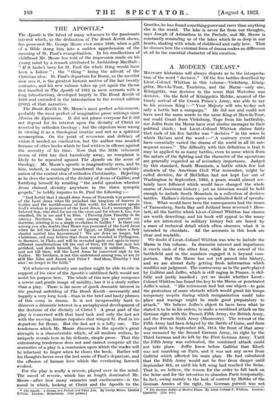THE APOSTLE.*
The Apostle is the latest of many witnesses to the passionate interest which, as the dedication of The Brook Kerith shows, has possessed Mr. George Moore ever since 1898, when a gift of a Bible stung him into a sudden apprehension of the meaning of St. Paul's evangelization. In his recollections of childhood Mr. Moore has told of the impression made on his young mind by a remark attributed to Archbishop MacHale : If it hadn't been for St. Paul the whole thing would have been a failure " ; the " thing " being the advent of the Christian idea. St. Paul's departure for Rome, as the novelist now sees it, is the greatest historic motive of the last twenty centuries, and his new volume takes up yet again the theme first handled in The Apostle of 1911 (a mere scenario with a long introduction), developed largely in The Brook Kerith of 1916 and extended in the introduction to the revised edition
(1922) of that narrative.
The Brook Kerith is Mr. Moore's most perfect achievement, probably the most perfect of imaginative prose writings since Marius the Epicurean. It did not please everyone for it did not depend for its interest upon the divinity of Christ as asserted by orthodox theology ; but the objectors were wrong in viewing it as a theological treatise and not as a spiritual reconception. On the point of reverence and delicacy of vision it needed no vindication, but the author was assailed because of other books which he had written in offence against the morality of his time. Now that the little vehement storm of 1916 has died harmlessly away, no complaint is likely to be repeated against The Apostle on the score of theology. Mr. Moore's apostle is imaginatively seen, and to him, indeed, is cunningly transferred the author's sophisti- cation of the central idea of orthodox Christianity. Rejecting as he does the assertion of the divinity of Jesus of Galilee, and fortifying himself by recalling " the awful question whether Jesus claimed _divinity anywhere in the three synoptic gospels," he boldly imputes to St. Paul the following :- " God forbid that I should deny Jesus of Nazareth was possessed of the Lord Jesus when He preached the kingdom of heaven in Galilee and the worthlessness of this world, for whosoever speaks God's wisdom is possessed of the Lord Jesus, God's messenger, His beloved Son, who died for me on the cross and for whom I, too, was crucified, He in me and I in Him. (Turning from Timothy to the others.) Brethren, who has come among you to pervert my doctrine, stinting it to a single revelation in Galilee ? Is there one among you who doubts that Moses was possessed of the Lord Jesus when he led the Israelites out of Egypt, or Elijah when a fiery chariot carried him heavenward ? We are Jews no longer, but Christians, and may believe that Jesus was revealed in Pythagoras, in Socrates, in Plato, and will be revealed again and again in many different manifestations till the end of time, till the last man has perished, and death himself, the last enemy, is subdued. Then, and not till then, will the Lord Jesus be converted nigh to his Father. My brethren, is not this understood among you, or are ye still like John and James and Peter ? And thou, Timothy ? but alas ! no longer in the faith."
Yet whatever authority our author might be able to• cite in support of his view of the Apostle's subtilized faith would not assist his purpose here. The whole of this new play composes a serene and gentle image of nobility, but it is a study rather than a play. There is far more of quick dramatic interest in the gradual unfolding of The Brook Kerith—necessarily and happily a very long book—than in the brief and hasty phrases of this essay in drama. Is it not inexpressibly hard to discover a dramatic interest in a metaphysical development of the doctrine of the divinity of Christ ? A great part of the play is concerned with that hard task and only the last act with the moving, human impulses that winged St. Paul in his departure for Rome. But the last act is a lofty one. The tenderness which Mr. Moore discovers in the apostle's great strength is a characteristic which, of all modern writers, he uniquely reveals here in his delicate, simple prose. That this culminating tenderness does not and cannot comprise all the necessities of a play is a conclusion upon which the reader will be reluctant to linger when he closes the book. Rather will his thoughts hover over the last scene of Paul's departure, and the effusion of human love which the everlasting farewell
evoked.
For the play is really a reverie, played over in the mind.
The mood of reverie, which has at length dominated Mr. Moore—after how many errancies and excitements—is the mood in which, looking at Christ and the Apostle to the
• The Apostle : a Drama in a Prelude and Three Acts. By George Moore. Limited Edition. London: Heinemann. tOne guinea,]
Gentiles, he has found something purer and rarer than anything else in the world. The lake is never far from our thoughts, says Joseph of Arimathea in the Prelude, and Mr. Moore is constantly reminding us of the lakes which lie so deep in our hearts, shaking with winds of childhood and early love. That he chooses here the external form of drama makes no difference at all to the essential character of his creation.


































 Previous page
Previous page